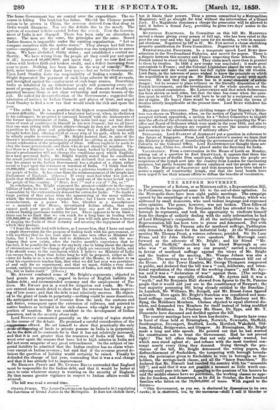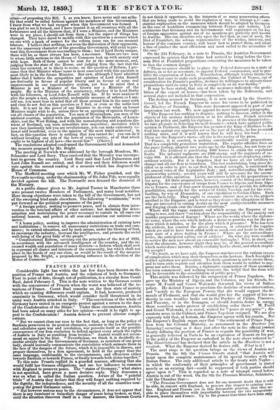THE REFORM MOVEMENT.
The presence of a Reform, or as Ministers call it, a Representation Bill, in Parliament, has imparted some life to the out-of-door agitation. In the Metropolis there have been eight public meetings. The campaign opened by the assemblage of a mob in Hyde Park on Sunday, which was addressed by small democrats, who used violent language and expressed ultra opinions. The peace, however, was not broken. Then followed meetings in the boroughs. Sir Benjamin Hall has attended two in the borough he represents, and took the opportunity to vindicate himself from the charges of unfairly dealing with the early information he had of Lord Ebrington's resignation. At all the metropolitan meetings the Representation bill has been torn to pieces and denounced. But with differences. While St. Pancras asks for manhood suffrage' Paddington only demands a fair share for the industrial body. At the Westminster meeting Mr. Thomas Prout, a veteran reformer, presided. Sir De Lacy Evans and Sir John Shelley were speakers. Mr. Murrough came forward as the advocate of Mr. Bright ; and his - friend "Mr. Mantel!, of Sheffield," described by his friend Mturough as one who was "as illiterate as any one present," carried a resolution in favour of manhood suffrage against the views of Mr. Bright and the leaders of the meeting. Mr. Wemys Jobson was also a speaker. The meeting was for "kicking" the Government bill out of the House. At the Tower Hamlets, Mr. George Thompson reappeared in public, and declared that the bill was a "cool, deliberate, and inten- tional repudiation of the claims of the working classes " ; and Mr. Ayr- ton said it was a "declaration of war" against them. [The savings- bank franchise was especially ridiculed. Mr. Ayrton said it was a "myth," and Sir Benjamin Hall showed from figures to the St. Pancras people that it would add just one to the constituency of Newport; the vast majority possessing 60/. being already entitled to the franchise. In Lambeth, Mr. Williams, Mr. Roupell, and Mr. Ernest Jones figured as leaders. Here again Mr. Bright's franchise was repudiated and man- hood suffrage carried. At Chelsea, there were Mr. Hanbury and Mr. Byng, the Middlesex Members. Chelsea objected to equal electoral dis- tricts, and demanded two Members for itself instead of being muddled up with Middlesex. In Finsbury Mr. Sheen, Dr. Epps, and Mr. T. Duncombe have discussed and decided against the bill. The country meetings have not been less decisive. Reports have come to hand of those held at Birmingham, Norwich, Newcastle Sheffield, Southampton' Devonport, Bradford, Leeds, Hertford, Wakefield, Old- ham, Kendal, Bridgewater, and Glasgow. At Birmingham, Mr. Bright made a long and able speech. He pointed out that he had warned his constituents not to trust the Government. Had he not proved right ? The bill offers things that not only nobody wanted, but which men stand aghast at; and refuses with the most insolent con- tempt nearly every thing they demand. Going through the pro- visions of the bill' Mr. Bright denounced the voting papers, the disfranchisement of freeholders, the tampering with borough bounda- ries, the permission given to freeholders to vote in boroughs as free- holders the savings-bank clause, and all the "fancy franchises." He declared that Mr. Disraeli had insulted the country with his "miserable bill "; and said that it was not possible a measure so little worth con- sidering could pass into law. Appealing to the passions of his hearers he said the middle-chases have no patriotism, the working classes no appe- tite for freedom, and dene,unced, as he did in October, the few hundred families who fatten on the 711,000,000/. of taxes. With regard to the future-- "This Government, as you see, is shattered by dissensions in its own ranks; it is, shattered, too, by the enormourb—shall I call it blunder or crime—of proposing this Bill. I, as you know, have never said one sylla- ble that could be called factious against the members of this Government. I knew from what we had escaped when this Government was formed. I was glad to see it formed, and I have treated it on all occasions with all the forbearance and all the fairness that, if I were a Minister, and the Ministers were in my place, I should ask from them; but the aspect of things has changed. They have dared to meddle with this question in a manner which no one with a spark of respect for the reform cause can for one moment tolerate. I believe that nothing, not even the dislocation of their opponents, nor the unsavoury character of the preceding Government, will avail to pre- vent this Government from succumbing to them ; but if Lord Derby resigns, there will be, as there always has been, a successor. There are two men to whom little sections in the House of Commons look up with anxiety and with hope. Both of them cannot be sent for at the same moment, and, judging from the state of the House, and judging from the fact that the crisis has occurred, or is likely to occur, on the question of Reform, I pre- sume that that Minister whose name is most associated with this question is most likely to be the future Minister. But now, although I have admitted before that I believe the sympathies and opinions of Lord John Russell are distinctly in favour of popular liberty and in favour of some real improvement in our representative system, yet bear in mind that a Minister is not a Minister of the Crown nor a Minister of the people. He is the Minister of the aristocracy, whether it be Lord Derby with his followers, or Lord John Russell with his. If he were anxious to give the people a real, substantial, undeniable measure of reform as I my- self am, you must bear in mind that all those around him in the same rank and class do not feel on this question as I feel, or even as the noble lord feels. It is not in the power of any Minister to do even what an honest Minister might wish to do unless there be an uprising of opinion through- out all classes of the population. You men of Birmingham, you men of the midland counties united with the population of the Metropolis, of Lanca- shire, and the West Riding, and with the manufacturing and populous dis- tricts of Scotland, can turn minorities into majorities ; measures which now they insolently tell you are revolutionary, you can make extremely ra- tional and beneficial, even in the opinion of the most timid aristocrat; in fact, on this question there is nothing that you cannot do; you can do it without breaking one iota of the laws of your country, or of that which ought to be highest of all laws—the moral law." (Cheers.)
The resolutions adopted condemned the Government bill and demanded the measure proposed by Mr. Bright. The meeting at Norwich was addressed by the borough Members, Mr. Schneider and Lord Bury. They resolved that the Ministry was incompe- tent to govern the country. Lord Bury said that Lord Palmerston and Lord John Russell are united, and that they and their followers would vote against the second reading of a measure which has disgraced the House of Commons.
The Sheffield meeting over which Mr. W. Fisher presided, and the Newcastle meeting, under the chairmanship of Sir John Fife, were equally decided against the bill. The Newcastle men demand the dismissal of the Ministry. At a public dinner given to Mr. Aspinal Turner in Manchester there were present twelve Members of Parliament, and many local notables. Here strong objections were taken to the bill of the Government, but not of the sweeping kind made elsewhere. The following "sentiments," were put forward as the political programme of the party. "A foreign policy, seeking to preserve peace, and to abstain from inter- vention in the internal affairs of other nations ; but declaring the deter- mination and maintaining the power necessary to sustain in all cases our national honour, and protect in all seas and countries our national com- merce."
"A home policy, seeking to improve the administration of existing laws and institutions ; to remove all unnecessary restrictions on trade and com- merce; to extend education, and by such means, under the blessing of God, to encourage the industry, increase the intelligence, and promote the social well-being of the great body of the people."
"Constitutional Reform, carrying out the principles of the Act of 1832, in accordance with the advanced intelligence of the country, and the in- creased wealth and population of many districts—a Reform which shall seek to represent all classes and interests of the community, but which shall not place in the hands of any one class, as would be the result of the measure proposed by Mr. Bright, a preponderating influence in the election of the House of Commons.



























 Previous page
Previous page